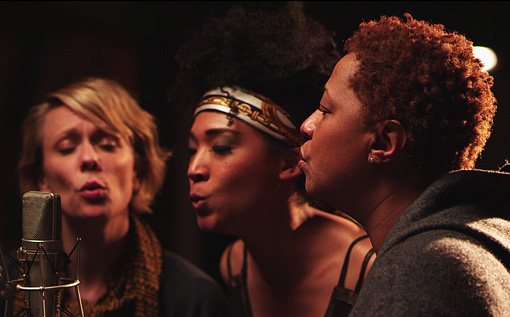(2019) Music Documentary (Eagle Rock) Ella Fitzgerald, Sophie Okonedo (narrator), Sharon D. Clark (narrator), Ray Brown Jr., Judith Tick, Smokey Robinson, Norma Miller, Patti Austin, Andre Previn, George Wien, Johnny Mathis, Itzhak Perlman, Tony Bennett, Laura Myula, Margo Jefferson, Gregg Field, Will Friedwald, Kenny Barron, Norman Granz, Dizzy Gillespie, Cleo Laine, Alexis Morrast. Directed by Leslie Woodhead
So many of the great musicians of the mid-20th century jazz scene are little more than names to most Americans now; some night even that. Ella Fitzgerald, the First Lady of Song, was a giant in her time, one of the defining voices of American music, one whose career spanned six decades.
Her career almost never happened. Part of the Great Migration of African-Americans moving from the South to the industrialized North in search of a better life, she moved to Yonkers as a child with her mother and stepfather. Her mother died when Fitzgerald was just 13 (the result of injuries incurred in a car accident), ending up living on the streets of New York after a stint in reform school where the abuse was so pervasive that she ran away. Only a victory in a 1934 talent show at the Apopllo Theater in Harlem would save her.
Discovered by the “King of Jazz Drummers” Chick Webb who led one of the most popular bands in New York at the time, Fitzgerald became a star after recording “A Tisket, A Tasket” – a jazzed up version of a nursery rhyme that Fitzgerald co-wrote) and she never looked back.
She embraced scat singing as World War II began and became one of its most accomplished practitioners. After the war, she recorded a string of hits for the Verve label (a jazz label founded specifically to market her) and became a mainstay touring around the world, often on the road for nine months of the year. That made it difficult to sustain a relationship with her only child, Ray Brown Jr., who became a musician himself although his relationship with his mother was often distant – the two rarely spoke during the last ten years of her life.
The movie utilizes archival footage that frames the times that Fitzgerald grew up in, as well as illustrating the racism that she faced throughout her life. When she purchased a house in Beverly Hills, she had to use her white manager Norman Granz to do it, despite the fact that she had more than enough cash to buy the house outright.
There is performance footage and we get a sense of the passion and the power of Fitzgerald’s craft. It could be said that she was married to her career; throughout most of her life it was her focus. She did love children and founded a foundation that helped provide food and healthcare to at-risk kids in the last years of her life, but mainly she expressed herself through her music; she was a highly private individual who rarely talked about her feelings in interviews, with a notable exception – a radio interview in 1963 when she finally spoke out against the racial injustice she had seen and that her people continued to deal with. The interview was never aired, a postscript that echoes through these uncertain and volatile times.
Her story is told largely in a chronological fashion, interspersed with interviews of contemporaries (both archival and modern), as well as a younger generation who recognize her influence on modern music. While the testimonials are glowing, the film largely fails to draw the lines between her music and modern music and when the movie ends, doesn’t really elucidate what her legacy is.
What survives first and foremost is the music and we get a fair sampling of it and we are left to marvel at her control and her phrasing. The movie is available on virtual cinema for the next couple of weeks (fans can benefit the Tampa Theater, the Polk Theater in Lakeland or the O Cinema in Miami (see the virtual cinematic experience link for a line-up of theaters across the country). It is also playing at the Enzian for those who want the big screen experience which I would highly recommend.
REASONS TO SEE: The soundtrack is simply amazing.
REASONS TO AVOID: The ending is abrupt and really doesn’t analyze her legacy at as much as I might have liked.
FAMILY VALUES: There are depictions of racism including some disturbing images.
TRIVIAL PURSUIT: When Fitzgerald won the legendary Apollo Theater’s talent contest in 1934, she hadn’t planned to sing but to dance as she had on Harlem street corners, but when she was preceded by the Edwards Sisters (two of the best dancers to ever come out of Harlem), she changed her mind and sang, believing she could never win against the sisters with dancing.
BEYOND THE THEATERS: Virtual Cinematic Experience
CRITICAL MASS: As of 6/28/20: Rotten Tomatoes: 86% positive reviews: Metacritic: 62/100.
COMPARISON SHOPPING: Keep On Keepin’ On
FINAL RATING: 6.5/10
NEXT: The Lego Movie 2: The Second Part



